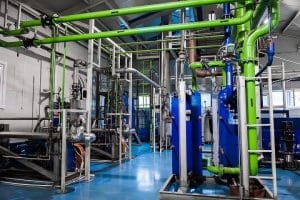 When it comes to technology, each new innovation of an existing application increases the technology user’s ability to do more, more efficiently. Sometimes, that means designing systems that are far more complicated than their predecessors. For example, laptops are lightyears beyond typewriters and old desktop computers thanks to more complex electronic systems. However, there are times when innovating technology means simplifying the processes that it operates on. For example, in the realm of electrical thermal management, heat exchangers achieve better thermal management results than previous solutions by making the process of handling waste heat simpler.
When it comes to technology, each new innovation of an existing application increases the technology user’s ability to do more, more efficiently. Sometimes, that means designing systems that are far more complicated than their predecessors. For example, laptops are lightyears beyond typewriters and old desktop computers thanks to more complex electronic systems. However, there are times when innovating technology means simplifying the processes that it operates on. For example, in the realm of electrical thermal management, heat exchangers achieve better thermal management results than previous solutions by making the process of handling waste heat simpler.
Cooling control panels and electrical enclosures
One of the first and still most popular applications for modern heat exchangers is to cool control panels and other electrical enclosures. Instead of the HVAC systems that companies traditionally relied upon to keep their technology cooled, heat exchangers can manage large amounts of waste heat in a much more streamlined manner. Using smaller and more efficient equipment than air conditioners, heat exchangers work by absorbing the waste heat generated within an electrical enclosure, and then transferring it somewhere it can be dissipated away from sensitive components, such as heat sink.
Facilitating in-house wastewater treatment
Using heat exchangers instead of air conditioners to cool control panels and electrical enclosures has helped companies save money in several areas while also boosting their systems’ overall productivity. However, companies also benefit even more from the technology by utilizing it for more than just electrical cooling. For example, heat exchangers can be designed to repurpose waste heat instead of dissipating it, allowing for more efficient processes such as in-house wastewater treatment. Rather than implementing more energy-reliant processes to apply heat, heat exchangers can transfer the heat collected during other thermal management processes and utilize it to facilitate wastewater treatment.
Removing heat from molds faster
In the molding industry, the principles of heat exchanger technology are more frequently being applied to machine tool cooling processes. The basis of heat transfer processes is to absorb and transfer waste heat rapidly, consistently, and efficiently. With specialized heat exchangers known as thermal pins, molding companies can apply these principles to removing heat from molds with optimal precision. Like traditional heat exchangers, thermal pins don’t rely on HVAC processes, and can be customized the fit the equipment and meet the needs of most molding companies.
For more information about what thermal management tasks heat exchangers can do better, call Noren Thermal Solutions in Taylor, TX, at 866-936-6736.







